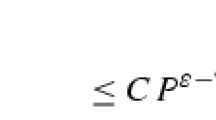Abstract
In 1985 Evertse and Gyory [5] gave explicit upper bounds for the number of solutions of norm form equations of the form (1.1) under the hypotheses that (i) x m ≢ 0, α 1 = 1, α 2 , ... ,α m-1 are Q-linearly independent and has degree at least 3 overQ( α 1 ..., α m-1 ), or that (ii) the degree of i is at least 3 over Q(α 1 , ..., α i-1 ) for i = 2, m. Later Győry [9], Evertse [3] and Evertse and Gy}ory [6] derived general upper bounds for arbitrary norm form equations which include the case (ii), but not the case (i). In the present paper we considerably improve the bounds of [5], and we give a further improvement which is valid for all but at most finitely many possible values of the constant term b of the equation. Our bound obtained under the assumption (ii) is better for almost all b than the general bounds of [9], [3] and [6].
Similar content being viewed by others
REFERENCES
A. BÉrczes, On the number of solutions of index form equations, Publ. Math. Debrecen 56 (2000), 251–262.
F. Beukers and H. P. Schlickewei, The equation x + y = 1 in _nitely generated groups, Acta Arith. 78 (1996), 189–199.
J.-H. Evertse, The number of solutions of decomposable form equations, Invent. Math. 122 (1995), 559–601.
J.-H. Evertse, The number of solutions of the Thue-Mahler equation, J. Reine Angew. Math. 482 (1997), 121–149.
J.-H. Evertse and K. GyŐry, On unit equations and decomposable form equations, J.Reine Angew. Math. 358 (1985), 6–19.
J.-H. Evertse and K. GyŐry, The number of families of solutions of decomposable form equations, Acta Arith. 80 (1997), 367–394.
J.-H. Evertse and H. P. Schlickewei, The absolute subspace theorem and linear equations with unknowns from a multiplicative group, in: Number Theory in Progress (K. GyŐry, H. Iwaniec and J. Urbanowicz, eds.), Walter de Gruyter, Berlin-New York, 1999, pp. 121–142.
K. GyŐry, Résultats effectifs sur la représentation des entiers par des formes décomposables, Queen's Papers in Pure and Applied Math., No. 56, Kingston, Canada, 1980.
K. GyŐry, On the representation of integers by decomposable forms in several variables, Publ. Math. Debrecen 28 (1981), 89–98.
K. GyŐry, Upper bounds for the number of solutions of unit equations in two unknowns, Lithuanian Math. J. 32 (1992), 40–44.
K. GyŐry, On the number of families of solutions of systems of decomposable form equations, Publ. Math. Debrecen 42 (1993), 65–101.
M. Laurent, Equations diophantiennes exponentielles, Invent. Math. 78 (1984), 299–327.
H. P. Schlickewei, On norm form equations, J. Number Th. 9 (1977), 370–380.
W. M. Schmidt, Linearformen mit algebraischen Koeffizienten II, Math. Ann. 191 (1971), 1–20.
W. M. Schmidt, Norm form equations, Ann. of Math. 96 (1972), 525–551.
W. M. Schmidt, The number of solutions of norm form equations, Trans. Amer. Math. Soc. 317 (1990), 197–227.
W. M. Schmidt, Diophantine approximations and diophantine equations, Springer-Verlag, 1991.
C. L. Stewart, On the number of solutions of polynomial congruences and Thue equations, J. Amer. Math. Soc. 4 (1991), 793–835.
Author information
Authors and Affiliations
Rights and permissions
About this article
Cite this article
Bérczes, A. On the number of solutions of norm form equations. Periodica Mathematica Hungarica 43, 165–176 (2002). https://doi.org/10.1023/A:1015246001884
Issue Date:
DOI: https://doi.org/10.1023/A:1015246001884




